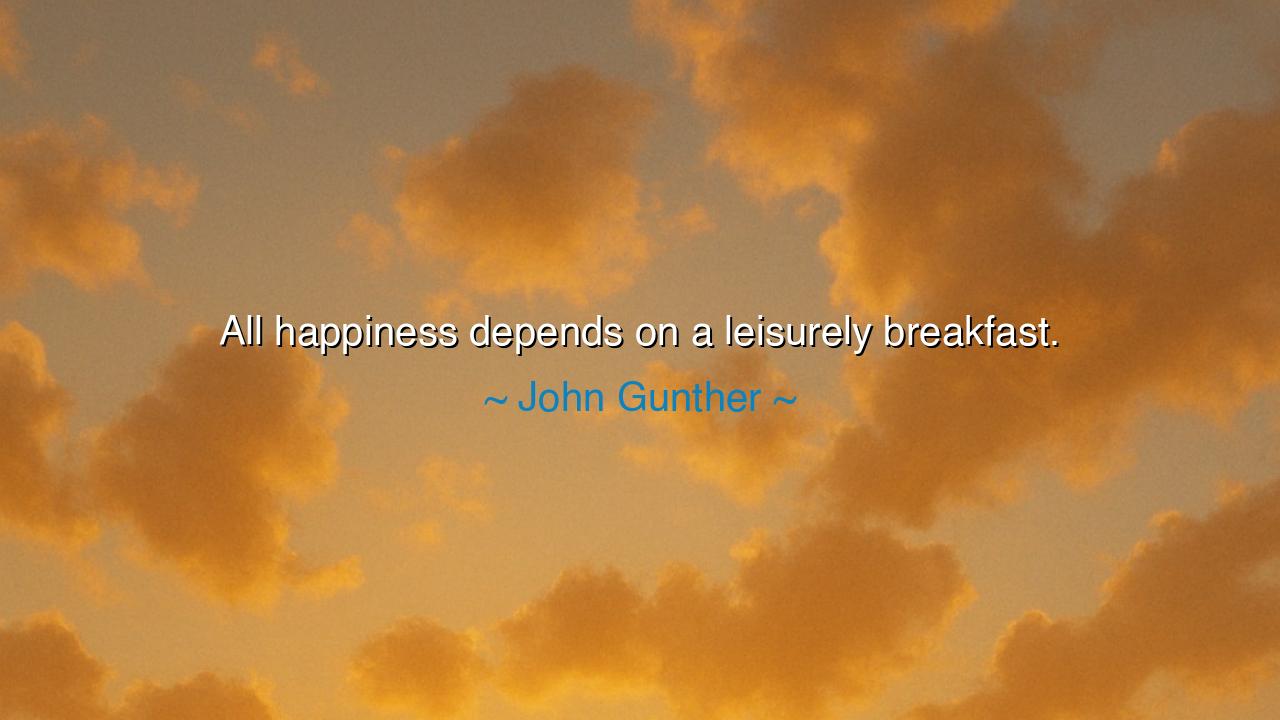
All happiness depends on a leisurely breakfast.






“All happiness depends on a leisurely breakfast.” Thus wrote John Gunther, the American journalist and author whose words, though simple and lighthearted, carry within them a quiet and profound wisdom. For beneath the humor of this saying lies a truth as old as time: that happiness is born not in the grand triumphs of life, but in the small, unhurried moments where the soul finds peace. A leisurely breakfast is not merely a meal — it is a symbol of balance, of presence, of gratitude for the ordinary. It is the art of beginning one’s day not with haste or hunger for achievement, but with calm acceptance of life’s rhythm.
The origin of this quote can be traced to Gunther’s reflections as a worldly observer of people and places. Having traveled widely and written about nations, politics, and power, he understood the restlessness of modern civilization — how men and women, in their pursuit of success, so often sacrifice their peace. In this light, his words are not trivial; they are an antidote to the fever of ambition. To say that “all happiness depends on a leisurely breakfast” is to say that joy arises not from excess or conquest, but from the ability to pause and be present. A man who can sit quietly at dawn, take nourishment without rush, and savor the warmth of the morning sun has already mastered the foundation of contentment.
For happiness, though endlessly sought, is rarely found by those who chase it. It hides in the pauses — in the spaces between duties, in the gentleness of routine, in the moments when one is not striving but simply being. The leisurely breakfast represents this sacred pause. It is the morning ritual of grounding oneself before the storm of the day. In the clinking of a spoon, in the scent of bread and tea, there is harmony — a reminder that the simple act of caring for oneself, of acknowledging the present, is itself an act of grace. Thus, Gunther’s statement, though cloaked in humor, is a meditation on mindfulness.
The ancients, too, understood this truth. The philosopher Epicurus, often misunderstood as a hedonist, taught that true pleasure lies not in luxury but in simplicity — in bread, water, and good company. His garden, where his disciples gathered for simple meals and tranquil discussion, was the ancient world’s leisurely breakfast. He declared, “Not what we have, but what we enjoy, constitutes our abundance.” So it is that Gunther’s wisdom echoes this ancient voice: happiness is not found in abundance, but in appreciation. The slow meal, the quiet dawn, the gratitude for nourishment — these are the foundations of peace.
Consider the story of Mahatma Gandhi, who led a nation through discipline and simplicity. Each morning, before the world demanded his strength, he began with silence, prayer, and a modest meal — a few fruits, some goat’s milk, and time to reflect. Though burdened with immense responsibility, he understood the power of stillness at the start of the day. This morning ritual gave him the clarity and courage to face the turmoil of empire. In this sense, Gandhi, too, knew that happiness — even amidst struggle — depends on the serenity one cultivates in small beginnings.
The wisdom of John Gunther’s words lies also in their quiet rebellion against the tyranny of haste. Modern life teaches us to rush, to measure time only by productivity, to eat standing or scrolling, as though every moment must serve ambition. But this ceaseless striving leaves the spirit starved. To sit down for a leisurely breakfast is, in truth, an act of defiance — a declaration that life’s worth is not in motion, but in meaning. It is to honor the day as a gift, not a burden. The one who takes time to begin slowly will meet the hours ahead with patience, strength, and joy.
Therefore, my children, take this wisdom to heart: slow down the beginning of your days. Do not leap from sleep to chaos, from dreams to duty, without greeting the morning in stillness. Sit with your thoughts, your meal, your breath. Savor what you have, and let gratitude fill the silence. A leisurely breakfast is not indulgence; it is the cultivation of the soul. For how you begin the day shapes how you will live it — with peace or with unrest, with grace or with greed.
And remember always the words of John Gunther: “All happiness depends on a leisurely breakfast.” They are not the jest of a man at ease, but the wisdom of one who has seen the cost of rushing through life. Happiness, my friends, is not found at the summit of success but in the stillness of the morning — in the calm, the gratitude, and the quiet courage to start each day slowly, with heart unhurried and spirit awake.






AAdministratorAdministrator
Welcome, honored guests. Please leave a comment, we will respond soon